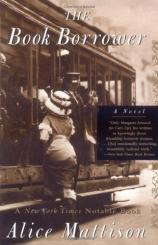Excerpt
Excerpt
The Book Borrower

Though she was pushing a baby carriage, Toby Ruben began to read a book, On a gray evening in late November 1920 and the wheel of the carriage a big, skeletal but once elegant Perego she'd found in somebody s trash rolled into a broken place in the sidewalk. The baby, tightly wrapped in a white receiving blanket, glided compactly from carriage to sidewalk. He didn't cry. Like his mother, the baby would be troubled more by missed human connections than by practical problems; also the three-second rule held: as if he were a fallen slice of bread, Ruben snatched him up and ate him. Kissed him passionately and all over, dropping the wicked book into the carriage. She put the baby back where he belonged and picked up the book, but she didn't read for at least a block. Then she did read.
On a gray evening in late November 1920, an observer who happened to be making his way up the hill from Dressier's Mills to the streetcar line that ran to the principal square of Boynton, Massachusetts, might have noticed a sturdy young woman hurrying through the mill s gates. The air was full of cinders, which must have been why she reached up to tie a veil over her face, though she did so with a gesture so casual, so obviously
Ruben had to cross a street. She closed the book. It was thin, with black covers, not new.
Want a book? a woman in the park had said. The woman wore a blue-and-white-checked dress like a pioneer s, but sleeveless. A wide neckline bared her freckled chest; with good posture she chased serious, muddy daughters in pink pinafores. Ruben s baby, Squirrel, was three months old. Go, Squirrel, go, Ruben shouted, just so the woman, sweeping by, would speak.
What? Sunny hair rose and settled.
He's trying to put his thumb in his mouth.
The woman leaned over to look, her hair over her face, and Squirrel found his thumb for the first time. Excellent, said the woman, Deborah Laidlaw, straightening, then giving a push to the small of her back. She left her hand there. When their conversation, skipping some subjects, arrived at sex and husbands, Deborah said, Jeremiah has intercourse only to music.
Any music?
Folk songs.
It was 1975.
Fuck songs! Ruben was surprised to have said that. Her hair was dark red but thin, and she was shorter than this impressive Deborah. In the songs, Ruben supposed, people built dams, harpooned whales, or cut down trees, while Jeremiah penetrated his wife.
History. He'll read any book about history, said Deborah, but mostly trolleys.
Trolleys?
Streetcars. He s obsessed with the interurbans. But there aren't any songs about trolleys.
Clang, clang, clang went the trolley! sang Ruben, flat who never sang for anyone but the baby.
Doesn't count. Want a book?
Jeremiah had found it in a used bookstore. He had begged Deborah to read it, but she only carried it back and forth to the park in a striped yellow-and-white cotton tote bag.
I am not interested in trolleys, said Deborah. Jeremiah has a theory about the person in the book. I don t care.
It s history?
A woman writing about her early life. About her sister.
It sounds interesting, said Ruben politely.
Good. You read it.
Ruben took the book: Trolley Girl, by Miriam James.
You can t keep it, said Deborah; Ruben was embarrassed but they d meet again. The daughters were Jill, who talked, and Rose, a big baby. Jill collected sticks and demanded to throw them into the river, a narrow glinty stream visible through trees. So Deborah carried Rose on her hip, striding away from Ruben, down a wooded slope where the carriage couldn't follow. Ruben watched: the back of a muscular woman walking in sandals, her dress disheveled by a child on her hip, and an earnest child running carefully, turning every few feet--this way!--as if only she knew where to find the river. Ruben had never been in this park, though she d lived in the city for most of a year, busy being pregnant. Forever she would have to remind herself that Deborah hadn't made the river.
She pushed her glasses up her nose and started for home. How snug and well-outfitted she would be when the Squirrel could ride on her hip, leaning confidently against her arm one short leg in front and one behind her--pointing like Rose, who used her mother as a friendly conveyance. Now he was only a package. At the sidewalk she opened the book. Then came--terrible to think about--the broken place, and then, when she d just begun the book again, the street to cross, and a dog she looked at. But now.
Excerpted from The Book Borrower © Copyright 2012 by Alice Mattison. Reprinted with permission by HarperCollins. All rights reserved.
The Book Borrower
- paperback: 288 pages
- Publisher: Harper Perennial
- ISBN-10: 0688177867
- ISBN-13: 9780688177867



